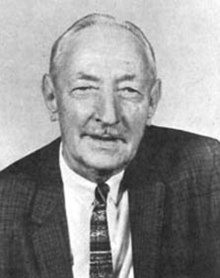Leslie Turner
| Leslie Turner | |
|---|---|
 |
|
| Born |
December 25, 1899 Cisco, Texas, USA |
| Died | March 2, 1988 (aged 88) Orlando, Florida |
| Nationality | American |
| Area(s) | Cartoonist |
|
Notable works
|
Captain Easy |
Leslie Turner (December 25, 1899 - March 2, 1988), known to his friends as Les Turner, was a syndicated comic strip writer-artist who produced the adventures of Captain Easy for more than three decades.
Born in Cisco, Texas, Turner grew up from age eight in Wichita Falls, Texas, where he started drawing while in high school. His grandfather was the courthouse architect and builder A. C. Swinburne, responsible for numerous courthouses across West Texas.
After serving briefly in the U.S. Army near the end of World War I, Turner began profiting from his art talent while a freshman at Southern Methodist University. He dropped out of college for one term to attend the Chicago Academy of Fine Arts. While a student at SMU, Turner and his college pals would make vagabond treks around the United States during the summer months. He edited SMU's 1922 yearbook, and after his graduation that same year with an English degree, he worked at a Dallas engraving plant.
While freelancing from Dallas, he sold a cartoon to Judge. He then married Bethel Burson of Silverton, Texas, and the newlyweds headed for New York where he became a freelance illustrator with work published in a variety of magazines, including Redbook, Pictorial Review, Ladies' Home Journal and Boys' Life. It took him two years to crack the major market, The Saturday Evening Post, work that included illustrating the popular "Plupy" stories of Henry Shute.
Jim Ivey, curator of the Cartoon Museum in Orlando, Florida, stated, "He was one of the best magazine illustrators in the 1920s and 1930s—the Golden Age of magazine illustrating. He was a superb artist." After six years in New York, the couple and their two daughters moved in 1929 to Colorado where they ran a small sheep ranch while living in a two-story stone house constructed by Turner. Unfortunately, the freelance assignments from New York soon slowed, but their Colorado claim required them to spend three years on the ranch. After four years in Colorado, they returned to New York, where Turner found work doing advertising illustrations.
...
Wikipedia
